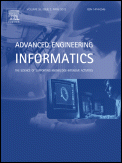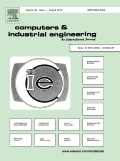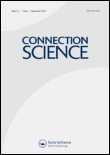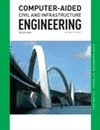
ADVANCED ENGINEERING INFORMATICS
Scope & Guideline
Advancing Knowledge in AI and Information Systems
Introduction
Aims and Scopes
- Advanced Computational Methods:
The journal emphasizes the development and application of advanced computational techniques, including machine learning, deep learning, and data mining, to solve complex engineering problems. - Digital Twin Technologies:
Research involving digital twin frameworks is a core focus, exploring how digital representations of physical systems can optimize design, monitor performance, and enhance predictive maintenance. - Human-Machine Collaboration:
The integration of human factors and machine learning in collaborative environments is highlighted, aiming to improve safety, efficiency, and productivity in engineering tasks. - Sustainable Engineering Practices:
The journal promotes research that addresses sustainability in engineering through innovative design, resource management, and lifecycle analysis. - Smart Manufacturing and Industry 4.0:
Papers often discuss the implications of Industry 4.0 technologies, including IoT, robotics, and cyber-physical systems, on manufacturing processes and operational efficiency. - Data-Driven Decision Making:
The application of data analytics for informed decision-making in engineering contexts is a recurring theme, with research focusing on predictive models and optimization techniques.
Trending and Emerging
- AI and Machine Learning Innovations:
A significant increase in papers employing cutting-edge AI methodologies, including generative models and reinforcement learning, showcases the journal's alignment with current technological trends. - Integration of Augmented and Virtual Reality:
Research integrating AR and VR technologies in engineering applications is on the rise, particularly in training and design processes, highlighting the importance of immersive technologies. - Advanced Data Analytics for Predictive Maintenance:
There is a growing emphasis on leveraging big data analytics and AI for predictive maintenance solutions, reflecting industry demands for efficiency and reliability. - Cyber-Physical Systems and IoT:
The emergence of research focusing on cyber-physical systems and the Internet of Things (IoT) indicates a trend towards interconnected systems and smart environments in engineering. - Sustainable and Circular Economy Practices:
An increasing number of papers addressing sustainability and circular economy principles in engineering design and manufacturing processes demonstrate a shift towards environmentally conscious engineering.
Declining or Waning
- Traditional Manufacturing Processes:
Research specifically focused on conventional manufacturing techniques has decreased, possibly due to the shift towards more automated and intelligent systems. - Manual Inspection Techniques:
There has been a decline in papers discussing manual inspection methods as the field increasingly adopts automated and AI-driven inspection technologies. - Basic Machine Learning Applications:
Papers that cover fundamental machine learning applications without advanced methodologies or innovative approaches are less frequently published, indicating a push towards more sophisticated techniques. - Regulatory Compliance in Isolation:
Research focusing solely on regulatory compliance without integration into broader technological frameworks appears to be waning, as interdisciplinary approaches become more favored.
Similar Journals

Computers & Industrial Engineering
Empowering Researchers with Impactful Insights and InnovationsComputers & Industrial Engineering, published by PERGAMON-ELSEVIER SCIENCE LTD, is a premier journal dedicated to advancing the fields of computer science and industrial engineering. Since its inception in 1976, this journal has become a vital resource for researchers and professionals, with a remarkable impact factor and distinguished Q1 quartile rankings in both the Computer Science and Engineering categories, reflecting its significant influence and respect within the academic community. Featuring a comprehensive scope that encompasses innovative computational methods, system optimization, and industrial applications, it serves as a platform for high-quality research that explores the interplay between technology and industrial processes. Although it does not currently offer open access, the journal's robust indexing in Scopus—ranked #12 in General Engineering and #15 in General Computer Science—underscores its commitment to disseminating cutting-edge knowledge and fostering collaboration among scholars, practitioners, and students globally. With its convergence spanning until 2024, Computers & Industrial Engineering is positioned at the forefront of emerging trends, making it an essential reference point for anyone dedicated to the evolution of technology in industry.

Machines
Pioneering advancements in mechanical and electrical engineering.Machines is a leading journal in the fields of engineering and computer science, published by MDPI in Switzerland since 2013. As an Open Access publication, it ensures that researchers, professionals, and students can freely access high-quality peer-reviewed research. The journal covers a diverse range of topics, including control and optimization, mechanical engineering, electrical engineering, and industrial manufacturing, boasting impressive rankings in various Scopus categories, such as Q2 in Computer Science and Control Systems Engineering. With a commitment to advancing knowledge and innovation in these critical areas, Machines serves as an essential platform for disseminating research findings and fostering collaboration within the academic community. By contributing to the ongoing dialogue in these dynamic fields, the journal plays a pivotal role in shaping the future of technology and engineering practices.

Studies in Informatics and Control
Catalyzing Innovation Across Global FrontiersStudies in Informatics and Control is a distinguished academic journal published by the NATL INST R&D INFORMATICS-ICI, specializing in the interdisciplinary fields of Computer Science and Electrical and Electronic Engineering. With an ISSN of 1220-1766 and a recognized standing within its field, this journal aims to foster innovation and disseminate high-quality research findings from 2010 through 2024. It maintains a significant presence in the academic landscape, holding a Q3 ranking in both Computer Science (miscellaneous) and Electrical and Electronic Engineering categories for 2023, which underscores its commitment to advancing knowledge and technology in these areas. While the journal is not open access, it provides valuable insights and results that are essential for researchers, professionals, and students striving to develop their expertise in informatics and control systems. Based in Romania, its contributions traverse international boundaries, appealing to a global audience keen on the latest developments and trends within these rapidly evolving fields.

Applied System Innovation
Fostering Collaboration for Tomorrow's SolutionsApplied System Innovation is a leading multidisciplinary journal published by MDPI, dedicated to advancing the fields of applied mathematics, artificial intelligence, control systems, human-computer interaction, and industrial and manufacturing engineering. With an impressive Open Access model established since 2018, it ensures that research findings are readily accessible to a global audience, fostering collaboration and innovation. The journal, boasting a robust impact in academia, has achieved multiple distinguished quartile rankings for 2023, including Q1 in Industrial and Manufacturing Engineering and Q2 in several other key disciplines. It is recognized in various Scopus categories, with notable rankings in applied mathematics and control systems. By encouraging high-quality research and providing a platform for knowledge exchange, Applied System Innovation plays a vital role in shaping the future of technology and engineering solutions. We invite researchers, professionals, and students alike to contribute to this dynamic field through impactful publications that inspire advancements in our understanding of complex systems.

SOFT COMPUTING
Transforming Theoretical Insights into Practical ApplicationsSOFT COMPUTING is a premier international journal published by Springer, focusing on the interdisciplinary field of soft computing, which includes areas such as fuzzy logic, neural networks, genetic algorithms, and their applications. With an ISSN of 1432-7643 and E-ISSN 1433-7479, the journal is based in Germany and contributes significantly to the advancement of knowledge in its fields, boasting an impressive Scopus ranking that places it in the top echelons of Geometry and Topology, Theoretical Computer Science, and Software categories. In the 2023 category quartiles, it has achieved Q2 rankings in multiple disciplines, reflecting its high-quality research contributions. Though not Open Access, the journal's rigor and relevance to contemporary issues make it a favored resource for researchers, professionals, and students alike. From its inception in 2000 and spanning across the years until 2024, SOFT COMPUTING continues to serve as a robust platform for innovative research and theoretical advancements, making it an essential read for anyone engaged in the rapidly evolving landscape of computational intelligence.

Intelligent Medicine
Revolutionizing healthcare outcomes with intelligent solutions.Intelligent Medicine, published by Elsevier, is a leading open-access journal dedicated to advancing the fields of Artificial Intelligence, Biomedical Engineering, Health Informatics, and related areas within Medicine. Since its inception in 2021, it has quickly established itself among the top tier of academic publications, holding a commendable Q2 ranking in several categories, including a rank of #51 in Health Informatics and #104 in Medicine (Miscellaneous) as of 2023. The journal aims to disseminate innovative research that harnesses AI technologies to improve healthcare outcomes, bridging the gap between cutting-edge technology and medical practice. With its open-access model, Intelligent Medicine ensures broad dissemination of research findings, facilitating collaboration and knowledge sharing among researchers, practitioners, and students globally. Located in Amsterdam, Netherlands, this journal plays a pivotal role in shaping the future of intelligent healthcare solutions, inviting submissions that push the boundaries of conventional medicine through creative and impactful research.

CONNECTION SCIENCE
Advancing the Frontiers of AI and Human-Computer InteractionCONNECTION SCIENCE, published by Taylor & Francis Ltd, is a premier open-access journal in the fields of Artificial Intelligence, Human-Computer Interaction, and Software Engineering, with an impressive history dating back to 1989. With an aim to foster innovative research and breakthroughs, this journal serves as a vital platform for scholars and practitioners seeking to publish and disseminate their findings. As of 2023, CONNECTION SCIENCE proudly holds a Q2 ranking in all three categories, reflecting its significance and influence within the academic community, supported further by robust Scopus rankings placing it in top percentiles across the disciplines. In addition to its extensive service to the global research community, it has transitioned to open access since 2022, enhancing the accessibility of high-impact research to a wider audience. For anyone involved in these dynamic fields, CONNECTION SCIENCE is crucial for keeping up with trends, theories, and practical applications that drive the future of technology and artificial intelligence.

COMPUTER-AIDED CIVIL AND INFRASTRUCTURE ENGINEERING
Advancing the Future of Infrastructure EngineeringCOMPUTER-AIDED CIVIL AND INFRASTRUCTURE ENGINEERING, published by WILEY, stands as a leading journal in the domains of civil and structural engineering, computational theory, and computer-aided design since its inception in 1986. With an impressive ISSN of 1093-9687 and E-ISSN of 1467-8667, this esteemed UK-based journal holds a prestigious position in the academic community, reflected by its Q1 ranking in numerous relevant categories, including Civil and Structural Engineering and Computer Graphics as of 2023. The journal is renowned for promoting innovative research that utilizes computational techniques to solve complex engineering problems, making it an essential resource for researchers, professionals, and students alike. Despite its lack of open access options, the journal garners significant interest due to its rigorous peer-review process and high-impact articles, underlining its importance in the advancement of infrastructure engineering practices and technologies. With a Scopus ranking placing it among the top journals in various engineering and computer science fields, COMPUTER-AIDED CIVIL AND INFRASTRUCTURE ENGINEERING continues to foster knowledge and collaboration, ultimately contributing to the future of smart and resilient infrastructure development.

TEHNICKI GLASNIK-TECHNICAL JOURNAL
Pioneering Insights in Engineering and Information SystemsTEHNICKI GLASNIK-TECHNICAL JOURNAL is a peer-reviewed, open-access journal published by UNIV NORTH in Croatia, dedicated to fostering knowledge and innovation in the fields of engineering, computer science applications, and information systems. With an ISSN of 1846-6168 and an E-ISSN of 1848-5588, this journal has been a vital resource for researchers since its transition to open access in 2009, ensuring that valuable insights are freely available to the global academic community. Notably, it has achieved a commendable presence in various Scopus categories, including ranking in the 34th percentile for general engineering and engaging with emerging trends in areas like computer graphics and management information systems. As of 2023, it holds quartile rankings ranging from Q3 in engineering to Q4 in several computer science categories, underlining its diverse scope and relevance. The journal aims to provide a platform for rigorous research, innovative methodologies, and practical applications, making it essential reading for academics, practitioners, and students interested in advancing their understanding and practice in technical disciplines.

Journal of Industrial Information Integration
Integrating Knowledge for Enhanced Industrial PracticesThe Journal of Industrial Information Integration, published by Elsevier, stands at the forefront of scholarly research in the fields of Industrial and Manufacturing Engineering and Information Systems and Management. With an ISSN of 2467-964X and an E-ISSN of 2452-414X, this esteemed journal provides a vital platform for disseminating innovative findings that bridge the gap between industry and academia. It is a recognized leader in its category, boasting a Q1 Quartile ranking in both relevant fields, reflecting its high-impact scholarly contributions. Notably, it ranks 3rd out of 148 in Decision Sciences and 7th out of 384 in Engineering disciplines on the Scopus rank, highlighting its significant influence within the research community. Researchers, professionals, and students engaged in the transformation of industrial practices through information integration will find this journal indispensable for accessing cutting-edge studies, methodologies, and case analyses. Operating under a closed access model, the journal also encourages submission of articles that contribute to advancing the theoretical and practical understanding of integrated industrial information systems, thus fostering innovation and progressive thinking in the field.